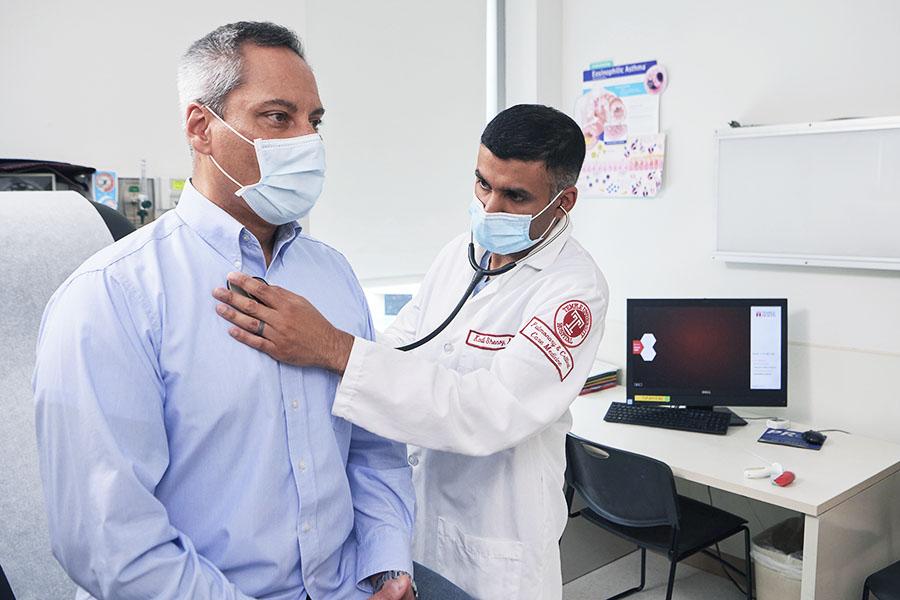What Is Crohn’s Disease?
Crohn's disease is a chronic condition that causes inflammation in any part of the gastrointestinal (GI) tract. Inflammation is swelling or irritation that may lead to sores, ulcers, scarring and other painful symptoms.
Most often, the inflammation strikes in the lower part of the small intestine (the ileum) and the beginning part of the large intestine (the colon). The disease was named after Dr. Burill Crohn, who first described the condition in 1932.
Crohn's disease is one of the two main types of inflammatory bowel disease (IBD). The other is ulcerative colitis.
The two diseases are similar, but the inflammation in Crohn's is more widespread throughout the GI tract than in ulcerative colitis, which only affects the colon. Also, inflammation in Crohn's often spreads deeper into spotty patches along the GI tract. Normal healthy areas may often appear in between the inflamed patches. By contrast, in ulcerative colitis, the swelling is continuous and may involve just part of the colon or its entirety.
Learn more about the differences between Crohn’s disease and ulcerative colitis.
Risk Factors
While the exact cause of Crohn’s disease is unknown, it is considered a genetic condition. Research has found that the chances of an individual inheriting the disease increases based on how many family members have Crohn’s:
- Individuals who have one parent with Crohn’s have a 7 to 9 percent lifetime risk.
- Individuals with two parents that suffer from IBDs have a 35 percent risk of developing Crohn’s.
There is no clear evidence stress and diet can cause Crohn’s, but learning to manage stress and avoid triggering foods can help you address and relieve symptoms.
Symptoms
Symptoms of Crohn’s disease include:
- Abdominal pain
- Bloody stool
- Diarrhea
- Fever
View all Crohn's disease symptoms
Personalized Care
Managing Crohn’s disease and its symptoms calls for expert care. The Temple Inflammatory Bowel Disease Program specializes in diagnosing, treating and managing Crohn’s. Patients receive highly personalized care from board-certified gastroenterologists with extensive experience in inflammatory bowel diseases. At Temple, we’re proud to deliver:
- Expert care for a complex disease – Every individual with Crohn’s is different; what works for one patient may not work for another. Our team completes a complete physical exam and order tests to deliver a pinpoint diagnosis of your condition.
- Individualized treatment – Once we understand your condition and treatment goals, we will work together to create treatment plans tailored to you. We stay by your side every step of the way, monitoring your progress and adjusting treatment as needed.
- Latest advances in care – Temple surgeons are leaders in minimally invasive surgery and are often the first to offer the newest standards of care in inflammatory bowel disease.
- Clinical trials – Part of a leading academic center, Temple physicians participate in the latest research and clinical trials for digestive disorders. You have the access and opportunity to participate in select trials.
- Convenient location – The Inflammatory Bowel Disease Program offers outstanding care at convenient locations across Greater Philadelphia.
The Inflammatory Bowel Disease Program is part of Temple’s Digestive Disease Center. This center delivers a team-centered, state-of-the-art approach to a wide range of digestive diseases and conditions. Our gastroenterologists are highly trained and offer the latest advances in care, including minimally invasive procedures and proven surgical techniques.
We are proud to be the proven leader in digestive disorders and deliver innovative care in diagnosing, treating and managing your condition so that you can live a full, healthy and active life.
When to Seek a Specialist
Crohn’s is a serious disease that requires a medical professional’s diagnosis and ongoing treatment. Contact a gastroenterologist if you suspect you have Crohn’s disease or experience changes in your bowel habits.
A gastroenterologist will work closely with you to diagnose, treat and manage your condition so you can enjoy your favorite activities and effectively manage your symptoms. Learn more about the gastroenterologists at Temple Health.
Ready for an Appointment?
If you're experiencing signs or symptoms of Crohn's disease, schedule an appointment or call 800-TEMPLE-MED (800-836-7536) today.
Learn more about our doctors and care team who diagnose and treat Crohn's disease.

